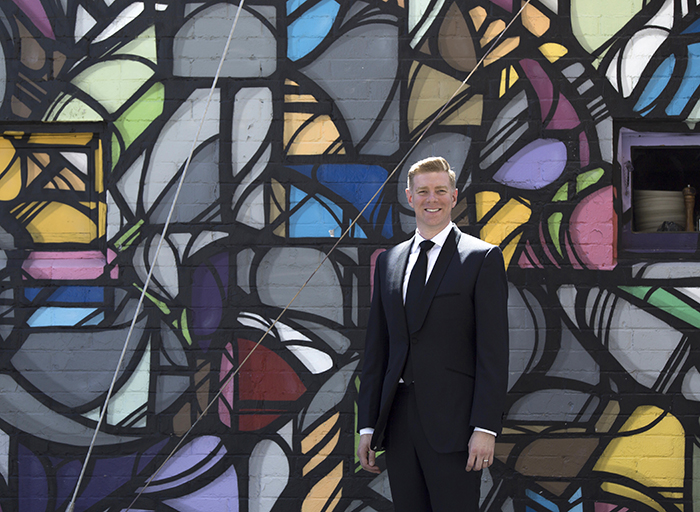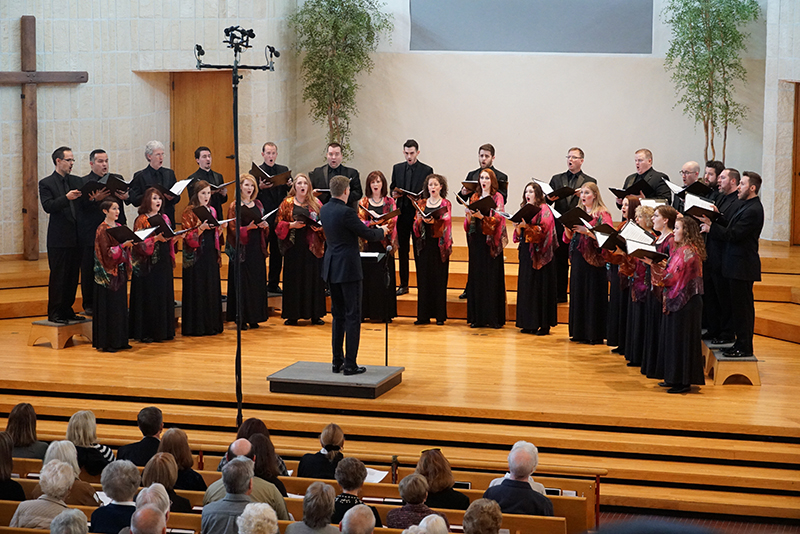Writer Joseph J. Airdo
Photography Courtesy of Phoenix Chorale
[dropcap]A[/dropcap]s an 8-year-old boy, Christopher Gabbitas listened to his father’s old LPs of choral and classical music recordings from the 60s and 70s. As the record player spun beneath the needle and his world filled with sound, he began to understand the unparalleled power of music.
Thirty-two years later, Gabbitas’s experience with music has expanded beyond even his wildest dreams. Although he has learned a lot more about it, his earliest inference remains the most resonant: Music makes him happy.
“Whatever else is happening in my life—whatever struggles, difficulties or decisions are concerning me—I can always turn to music and find peace and solitude,” Gabbitas says. “I normally find that, when I am wrestling with a big decision, if I get involved with music for an hour or two, the decision has worked itself out in my mind. It is almost like my therapy.”
Rather than keeping the happiness that he has discovered through music for himself, Gabbitas has made it his life-long mission to share it with the world.
He has been involved with music throughout his entire life, having gone from boy-chorister at Rochester Cathedral in Kent County, England, to choral scholar at St. John’s College, Cambridge University, where he graduated with a law degree. He continued singing even as he began his career as an attorney, performing with a number of different groups.
In 2004, he joined The King’s Singers—a British a cappella vocal ensemble with which he would go on to perform almost 2,000 concerts worldwide, conduct more than 500 master classes and appear in more than 30 commercial recordings.
He had an exceptionally successful career with the group until late last year, when he announced that he would be stepping down from it.
“A group like that is cyclical,” Gabbitas explains. “You have different forms of membership as time goes on. When I joined The King’s Singers, I was a young guy—the only bachelor in the group. The majority of the members had families so there was a great work-life balance and there was a lot of consideration given to singers who had children.”
At the time, Gabbitas found the situation to be a bit frustrating as he just wanted to carry on singing and touring. But he respected it with the assumption that the same courtesy would be extended to him once he had a family. Unfortunately, the group dynamic eventually shifted younger and Gabbitas found himself becoming the only member with children.
“Without that critical mass of fathers in the group, it was a lot harder for me to maintain a decent balance between touring and home life,” Gabbitas says. “It became obvious to me that my position was a bit untenable. I had also done the repertoire for so long that it was not challenging me anymore.”
Gabbitas looked for a new challenge—one that would not only give him an opportunity to spread his creative wings but also allow him to share with others everything that he had learned over the course of his career as a professional singer.
“What I enjoyed the most during my final few years in The King’s Singers was the time that we spent doing master classes and passing on what we knew to choirs,” Gabbitas explains. “We were describing our craft and passing it on to other people. I really enjoyed that process.”
He took an artist professor position at the University of Redlands, teaching a new master’s degree course focusing on elite choral performance along with music business education. He also applied for an artistic director position with Phoenix Chorale at the encouragement of one of its members, his friend Kira Zeeman Rugen.
Gabbitas had heard of Phoenix Chorale about five years earlier when he stumbled upon its rendition of one of his favorite Christmas carols—“A Spotless Rose” by composer Herbert Howells.
“Each year, I like to create a Spotify playlist of different versions of the song to analyze and compare in terms of pacing, sound, text and diction,” Gabbitas notes. “The clarity and the honesty of Phoenix Chorale’s performance really struck me and I found myself listening to it over and over again. I sought out more of their recordings and tried to find out more about them.”
Gabbitas was delighted to learn this past summer that the chorale had selected him for the artistic director position, granting him an opportunity to work with the group of which he had become a fan. He believes that the collective weight of his experience has prepared him for this exciting new chapter in his career.
“These are some of the finest professional singers in North America,” Gabbitas says. “If you are going to stand in front of people like that, you have got to own your position and know that you are worthy. I think all of my training and experience has brought me to this point where I feel confident to be in front of the Phoenix Chorale.”
Gabbitas’s first year at the helm of Phoenix Chorale will be somewhat of a transition season. He intends to spend plenty of time listening, learning and working out what the singers enjoy and what techniques and procedures they get the most out of through rehearsals and performances.
“When you join a new organization, you cannot come in and present huge swaths of change,” says Gabbitas, noting that he will begin developing a blueprint of how to move forward during his second season with the ensemble.
“You have got to work within the existing framework and not so much change things as grow them—and build upon them organically.
“I am looking forward to working with the singers in the Phoenix Chorale, hearing their ideas and putting performances together as an ensemble. But I am also looking forward to coming in with my own ideas.”
Gabbitas opened Phoenix Chorale’s season in October with the Lux Aeterna concert series before taking a brief break for its concerts in December. He returns this spring to helm the ensemble’s Cosmos and Birth and Rebirth concert series.
The Cosmos concert series will take audiences on an interstellar journey through ancient and modern cultures Feb. 28–March 1 with night sky-inspired music. The Birth and Rebirth concert series April 24–26 will then celebrate some of the most timeless and inspiring works for voices, from the Renaissance to the present day.
“The repertoire in the first season is fairly standard and fairly mixed with a good variety and balance of artistic concepts that lend themselves well to concerts,” Gabbitas says. “Perhaps we will present music with a slightly different interpretation, but we will really just be honoring the wealth of contemporary American choral music.”
As Gabbitas moves into the new horizons that await him, he aspires to use that unparalleled power of music that he discovered long ago for the greater good. He believes that tangible benefits to spiritual, emotional and physical health are manifested not only through regular performance with choral groups and belonging to a community that sings, but also listening to music in general.
“I have seen the benefits that music can bring to children through their education,” Gabbitas says. “I have seen the healing power that music can bring to adults who are struggling. There are so many people out there who can benefit from music, so I want to share my joy of choral singing as far and as wide as possible.”
Gabbitas believes Phoenix Chorale is the perfect vehicle for that mission.
“Phoenix Chorale is a shining gem in the middle of the desert,” he says. “It is the most extraordinary group of the most extraordinary people. They are pretty amazing on their own, but when you put them together, they can move mountains. It is that sense of community, dedication, teamwork and family that adds to the sound.”
Phoenix Chorale Presents Cosmos
Feb. 28–March 1 | See website for times and locations. | $37 | 602-253-2224 | phoenixchorale.org









Comments by Admin